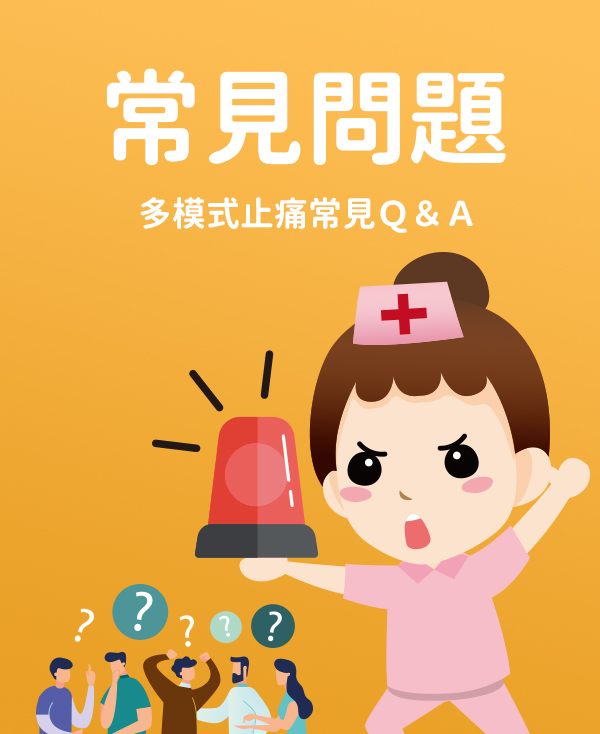

Clinically, patients often ask me before surgery, "Will it be painful to have the operation?" Pain is a subjective feeling, however. Usually, physicians can only rely on patient feedback experience of the same type of surgery in the past to make an assessment. In recent years, with the improvement of living standards, the public for medical quality requirements are also higher and higher, so medical professionals have been trying to research and develop new "pain control" methods. The latest concept reveals that "pain relief" should not be controlled singly, but multimodal should be adopted.
For example, in traditional postoperative care, most patients are often treated with single-agent pain relief methods using opioids such as morphine. However, this approach frequently results in side effects like nausea and vomiting. "Multimodal pain management," on the other hand, combines traditional opioids with anti-inflammatory pain medications, ultrasound-guided nerve blocks, and other techniques. This approach tailors pain relief to individual physiological conditions and the surgical site, providing the best possible pain control with milder side effects compared to traditional methods.
(courtesy of Dr. Xinen Li, Department of Anesthesiology, Cathay General Hospital)
It is a wrong idea to endure postoperative pain. In clinical cases of medical professions, patients often complain about pain after the operation. However, they are unwilling to accept pain control, which leads to various sequelae such as acute pain evolves into chronic pain. They don’t want to move after surgery and delay the time of rehabilitation, which leads to slow recovery. In severe cases, they even stimulate sympathetic nerve excitement because of pain, leading to blood pressure, rise in high blood pressure and stroke, and even die of sudden myocardial infarction.
The above situation indicates that pain is a warning sign from the body. If patients neglect, it is likely to become a fuse to ignite a health crisis. Therefore, well-planned postoperative pain control should also include in the items of communication and evaluation with doctors before the operation.(courtesy of Dr. Xinen Li, Department of Anesthesiology, Cathay General Hospital)
Based on many years of clinical experience observation, many patients who have just undergone surgery are often hesitant to get out of bed and move around even one to two days after the anesthesia has worn off and they are fully awake. They fear that any sudden movement may pull on their incisions and cause intense pain. In reality, it is advisable to attempt early mobilization within 24 hours after surgery. This not only promotes gastrointestinal motility and helps with gas expulsion but also prevents pneumonia. Moreover, it allows for the initiation of postoperative rehabilitation at an early stage, which is beneficial for the patient's overall recovery. Taking knee joint surgery as an example, effective pain control is essential because patients need to begin rehabilitation shortly after surgery. If they avoid rehabilitation due to the fear of pain, it can directly impact the subsequent recovery of the knee joint.
Therefore, postoperative pain control is an extremely important aspect of contemporary medical treatment. Based on many years of clinical experience observation, many patients who have just undergone surgery are often hesitant to get out of bed and move around even one to two days after the anesthesia has worn off and they are fully awake. They fear that any sudden movement may pull on their incisions and cause intense pain. In reality, it is advisable to attempt early mobilization within 24 hours after surgery. This not only promotes gastrointestinal motility and helps with gas expulsion but also prevents pneumonia. Moreover, it allows for the initiation of postoperative rehabilitation at an early stage, which is beneficial for the patient's overall recovery. Taking knee joint surgery as an example, effective pain control is essential because patients need to begin rehabilitation shortly after surgery. If they avoid rehabilitation due to the fear of pain, it can directly impact the subsequent recovery of the knee joint. Therefore, postoperative pain control is an extremely important aspect of contemporary medical treatment. (Provided by Cathay Anesthesia Department - Dr. Lee Hsin-En)
Pain is subjective. Doctors will rate your pain out of 10. 0 means no pain, 10 means severe pain. The patient is asked to fill in the form and the doctor will do the assessment.
In clinical pain control assessment, doctors will mainly focus on patients' subjective feelings in principle. Secondly, anesthesiologists will observe the patient's heart rate and blood pressure for further analysis and then apply appropriate pain relief methods.(courtesy of Dr. Xinen Li, Department of Anesthesiology, Cathay General Hospital)
(courtesy of Dr. Xinen Li, Department of Anesthesiology, Cathay General Hospital)
There are three kinds of clinical analgesic methods: oral analgesic, intramuscular or intravenous analgesia, and patient-controlled analgesia (PCA). Among them, oral administration has long-term and short-term effects. Intramuscular or intravenous analgesia also has short-term and long-term analgesic effects up to seven days. And there are two types of self-controlled analgesia: intravenous injection and epidural injection.
At present, postoperative pain relief methods and drugs are quite diverse, each of which has different applicable situations and side effects. It still requires the advice of a professional physician before use. Consider that each patient's physique, physical condition, and surgical methods are different. Therefore, the professionally trained attending physicians in the postoperative pain relief team of various hospitals should provide the best professional choice for the specific postoperative condition based on the evaluation results!
(courtesy of Dr. Xinen Li, Department of Anesthesiology, Cathay General Hospital)